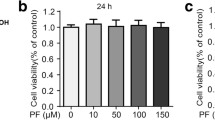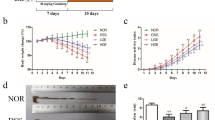Abstract
Increasing evidences have shown that resveratrol could protect the brain from ischemic injury; the mechanisms underlying its neuroprotective effects are multifactorial and not fully understood. It remains unclear whether resveratrol could exert neuroprotection through modulating gut-brain axis, which plays important roles in stroke pathology. In this study, C57BL/6 mice underwent middle cerebral artery occlusion (60 min) followed by reperfusion for 3 days. Resveratrol, when applied immediately after MCAO onset for 3 days, promoted Th1/Th2 balance towards Th2 polarization and skewed Treg/Th17 balance towards Treg in the small intestinal lamina propria (SI-LP), and decreased small intestinal pro-inflammatory cytokines expression through modulating intestinal flora at 3 days post-ischemia (dpi). Resveratrol attenuated cerebral ischemia-induced increase in the epithelial and vascular permeability of small intestine as evidenced by reduced evans blue extravasasion and decreased protein leakage by feces/plasma albumin ratio at 3 dpi. The blood levels of pro-inflammatory cytokines at 3 dpi were also attenuated by resveratrol due to inhibiting intestinal pro-inflammatory immunity and decreasing epithelial and vascular permeability. Resveratrol robustly protected against post-stroke inflammation-induced blood–brain barrier disruption not only in the cortex but also in the striatum at 3 dpi. Furthermore, resveratrol mediated smaller cerebral infarcts and less neurological deficits via decreasing the levels of pro-inflammatory cytokines in the peri-infarct area at 3 dpi. Our results for the first time demonstrated that resveratrol may inhibit systemic post-stroke inflammation and neuroinflammation via modulating intestinal flora-mediated Th17/Tregs and Th1/Th2 polarity shift in SI-LP, which may be one of the mechanisms underlying the neuroprotective effects of resveratrol.








Similar content being viewed by others
Abbreviations
- dpi:
-
Days post-ischemia
- BBB:
-
Blood–brain barrier
- Treg:
-
Regulatory T
- γδ T:
-
Gamma delta T
- Th17:
-
T helper type 17
- SI-LP:
-
Small intestinal lamina propria
- IFN-γ:
-
Interferon-γ
- IL-17A:
-
Interleukin-17A
- MCAO:
-
Middle cerebral artery occlusion
- TTC:
-
2,3,5-Triphenyltetrazolium chloride
- LPL:
-
Lamina propria lymphocytes
- VAN:
-
Vancomycin
- AC:
-
Amoxicillin and clavulanic acid
- ZO-1:
-
Zonula occludens 1
References
Asahi M, Wang X, Mori T et al (2001) Effects of matrix metalloproteinase-9 gene knock-out on the proteolysis of blood-brain barrier and white matter components after cerebral ischemia. J Neurosci 21:7724–7732
Bauche D, Marie JC (2017) Transforming growth factor beta: a master regulator of the gut microbiota and immune cell interactions. Clin Transl Immunol 6:e136
Belkaid Y, Harrison OJ (2017) Homeostatic Immunity and the Microbiota. Immunity 46:562–576
Benakis C, Brea D, Caballero S et al (2016) Commensal microbiota affects ischemic stroke outcome by regulating intestinal gammadelta T cells. Nat Med 22:516–523
Bereswill S, Munoz M, Fischer A, Plickert R, Haag LM, Otto B, Kuhl AA, Loddenkemper C, Gobel UB, Heimesaat MM (2010) Anti-inflammatory effects of resveratrol, curcumin and simvastatin in acute small intestinal inflammation. PLoS ONE 5:e15099
Bird JK, Raederstorff D, Weber P et al (2017) Cardiovascular and antiobesity effects of resveratrol mediated through the Gut microbiota. Adv Nutr 8:839–849
Denes A, Humphreys N, Lane TE et al (2010) Chronic systemic infection exacerbates ischemic brain damage via a CCL5 (regulated on activation, normal T-cell expressed and secreted)-mediated proinflammatory response in mice. J Neurosci 30:10086–10095
Doyle KP, Simon RP, Stenzel-Poore MP (2008) Mechanisms of ischemic brain damage. Neuropharmacology 55:310–318
Gao D, Zhang X, Jiang X et al (2006) Resveratrol reduces the elevated level of MMP-9 induced by cerebral ischemia-reperfusion in mice. Life Sci 78:2564–2570
Honda K, Littman DR (2016) The microbiota in adaptive immune homeostasis and disease. Nature 535:75–84
Huang J, Upadhyay UM, Tamargo RJ (2006) Inflammation in stroke and focal cerebral ischemia. Surg Neurol 66:232–245
Iadecola C, Anrather J (2011) The immunology of stroke: from mechanisms to translation. Nat Med 17:796–808
Jeong SI, Shin JA, Cho S et al (2016) Resveratrol attenuates peripheral and brain inflammation and reduces ischemic brain injury in aged female mice. Neurobiol Aging 44:74–84
Ladinsky MS, Araujo LP, Zhang X et al (2019) Endocytosis of commensal antigens by intestinal epithelial cells regulates mucosal T cell homeostasis. Science 363:eaat4042
Lakhan SE, Kirchgessner A, Hofer M (2009) Inflammatory mechanisms in ischemic stroke: therapeutic approaches. J Transl Med 7:97
Lambertsen KL, Biber K, Finsen B (2012) Inflammatory cytokines in experimental and human stroke. J Cereb Blood Flow Metab 32:1677–1698
Lee R, Lee M, Wu C et al (2018) Cerebral ischemia and neuroregeneration. Neural Regen Res 13:373–385
Lin Y, Chen F, Zhang J et al (2013a) Neuroprotective effect of resveratrol on ischemia/reperfusion injury in rats through TRPC6/CREB pathways. J Mol Neurosci 50:504–513
Lin Y, Zhang JC, Fu J et al (2013b) Hyperforin attenuates brain damage induced by transient middle cerebral artery occlusion (MCAO) in rats via inhibition of TRPC6 channels degradation. J Cereb Blood Flow Metab 33:253–262
Littman DR (2018) Do the microbiota influence vaccines and protective immunity to pathogens? If so, is there potential for efficacious microbiota-based vaccines? Cold Spring Harb Perspect Biol 10:a029355
Lopez MS, Dempsey RJ, Vemuganti R (2015) Resveratrol neuroprotection in stroke and traumatic CNS injury. Neurochem Int 89:75–82
Luo A, Leach ST, Barres R et al (2017) The microbiota and epigenetic regulation of T Helper 17/regulatory T cells: in search of a balanced immune system. Front Immunol 8:417
Pangeni R, Sahni JK, Ali J et al (2014) Resveratrol: review on therapeutic potential and recent advances in drug delivery. Expert Opin Drug Deliv 11:1285–1298
Pillai DR, Shanbhag NC, Dittmar MS et al (2013) Neurovascular protection by targeting early blood-brain barrier disruption with neurotrophic factors after ischemia-reperfusion in rats. J Cereb Blood Flow Metab 33:557–566
Postler TS, Ghosh S (2017) Understanding the holobiont: how microbial metabolites affect human health and shape the immune system. Cell Metab 26:110–130
Rauf A, Imran M, Suleria H et al (2017) A comprehensive review of the health perspectives of resveratrol. Food Funct 8:4284–4305
Ruiz L, Delgado S, Ruas-Madiedo P et al (2017) Bifidobacteria and their molecular communication with the immune system. Front Microbiol 8:2345
Spychala MS, Venna VR, Jandzinski M et al (2018) Age-related changes in the gut microbiota influence systemic inflammation and stroke outcome. Ann Neurol 84:23–36
Stanley D, Mason LJ, Mackin KE et al (2016) Translocation and dissemination of commensal bacteria in post-stroke infection. Nat Med 22:1277–1284
Wang Y, Li L, Deng S et al (2018) Ursolic acid ameliorates inflammation in cerebral ischemia and reperfusion injury possibly via high mobility group box 1/toll-like receptor 4/NFkappaB pathway. Front Neurol 9:253
Wynn JL, Wilson CS, Hawiger J et al (2016) Targeting IL-17A attenuates neonatal sepsis mortality induced by IL-18. Proc Natl Acad Sci USA 113:E2627–E2635
Yang Y, Rosenberg GA (2011) Blood-brain barrier breakdown in acute and chronic cerebrovascular disease. Stroke 42:3323–3328
Yao J, Wei C, Wang JY et al (2015) Effect of resveratrol on Treg/Th17 signaling and ulcerative colitis treatment in mice. World J Gastroenterol 21:6572–6581
Zhang J, Mao X, Zhou T et al (2014) IL-17A contributes to brain ischemia reperfusion injury through calpain-TRPC6 pathway in mice. Neuroscience 274:419–428
Zhao L, Zhang Q, Ma W et al (2017) A combination of quercetin and resveratrol reduces obesity in high-fat diet-fed rats by modulation of gut microbiota. Food Funct 8:4644–4656
Author information
Authors and Affiliations
Contributions
Experimental design: YQL; stroke model, behavioral test, flow cytometry, TTC staining, western blotting, permeability assay, ELISA: ZGD, XFR, EXZ; RT-qPCR, hematoxylin and eosin staining, gut injury score: LXZ; imaging tools: ZCD; data analysis: XFR; wrote article: ZCD.
Corresponding author
Ethics declarations
Conflicts of interest
The authors declare that they have no conflict of interest.
Ethical Approval
All procedures were performed in accordance with the National Institute of Health Guide for the Care and Use of Laboratory Animals (NIH Publications No. 80-23) revised 1996 and approved by the Animal Care and Use Committee of The First Affiliated Hospital of Zhengzhou University.
Informed Consent
Informed consent was obtained from all individual participants included in the study.
Additional information
Publisher's Note
Springer Nature remains neutral with regard to jurisdictional claims in published maps and institutional affiliations.
Rights and permissions
About this article
Cite this article
Dou, Z., Rong, X., Zhao, E. et al. Neuroprotection of Resveratrol Against Focal Cerebral Ischemia/Reperfusion Injury in Mice Through a Mechanism Targeting Gut-Brain Axis. Cell Mol Neurobiol 39, 883–898 (2019). https://doi.org/10.1007/s10571-019-00687-3
Received:
Accepted:
Published:
Issue Date:
DOI: https://doi.org/10.1007/s10571-019-00687-3




